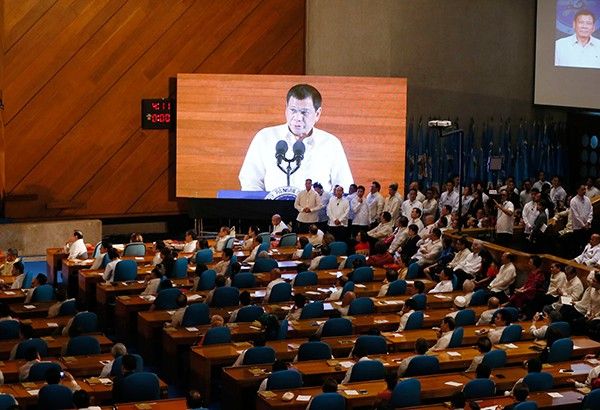OPINION: Corruption


Congress just approved a budget worth P4.1 trillion. Probably not surprising given how the economy is growing and so is the population.
What bothers me is the amount of money we will certainly lose due to corruption. We have taken corruption for granted, but the amount lost to corruption in a P4.1 trillion national budget should be eye-popping.
Let us just assume we will lose a very conservative estimate of 25 percent to corruption. That’s a trillion pesos right there. That kind of money can build a lot of school houses, equip classrooms with computers, build infrastructure to deal with traffic congestion, and help farmers become more productive among many other things.
But right now, that P1 trillion only lines the pockets of our politicians and their cronies. We all know who they are, but we keep on electing them. Sometimes, we can be forgiven to think we are hopeless.
Corruption is costing us more than we want to know in terms of bad education and health care among other lost services.
Those bad test scores where our children gave test results that placed us last among 79 countries in reading literacy, second to the last in mathematics and science literacy can be blamed on corruption. Money that should go to good teacher training and education infrastructure go to secret bank accounts of politicians and their cronies instead.
The poor state of our people’s health can also be blamed on inadequate resources being invested on health facilities and services nationwide. How can unhealthy people contribute to national growth?
According to a recently published IMF paper, “spending on education and health is likely to be lower where corruption is high, making it less likely that worker productivity and living standards will improve. Among low-income countries, the share of the budget dedicated to education and health is one-third lower in more corrupt countries…
“It should come as no surprise, then, that test scores tend to be lower in countries where corruption is more prevalent. While students in more corrupt countries may spend as much time in the classroom as those in other countries, the quality of instruction is worse.
“This is not just about spending less on education. In some countries, access to teaching jobs in public schools is influenced by bribes or connections…”
The IMF paper points out that, “curbing corruption can yield significant fiscal benefits. Our research suggests that revenues are higher in countries perceived to be less corrupt; the least corrupt governments collect four percent of GDP more in taxes than those at the same level of economic development with the highest levels of corruption.”
What is this saying about our current efforts at tax reform?
While we do need to fix distortions in our current tax laws, there seems to be too much focus on raising tax rates than in addressing corruption in the tax collection agencies. Good intentioned as the administration’s tax reformers are, they cannot assume honesty in tax collection.
That’s why I have been advocating greater simplification in tax collection procedures that will minimize interaction between BIR examiners and taxpayers. Even President Duterte is frustrated enough to advocate a gross income tax system to the annoyance of tax experts.
The IMF gives us support in advocating more attention to curbing corruption by citing the case of Georgia.
“Reducing corruption is a challenge, but it can bring substantial benefits. Countries that reduce corruption significantly are rewarded with surges in tax revenue.
“This was the case in Georgia, where in 2003 a new government launched an aggressive campaign to reduce corruption from very high levels. The result: tax revenue jumped from 12 percent to 25 percent of GDP in five years, even as tax rates were lowered.
“Georgia’s success reflected a new culture of tax compliance: the share of people who felt it was never justifiable to cheat jumped from about 50 percent to almost 80 percent.
“Improvements in services, including lower crime rates and fewer power outages, and renewed trust in government made people more willing to pay taxes. Higher revenue also made it possible to clear wage and pension arrears, further bolstering confidence in government.”
A good way of looking at our newly approved P4.1 trillion budget is in terms of how corruption reduces the bang we get from every peso spent. Here is how the IMF puts it:
“… the cost of corruption is greater than the sum of lost money: distortions in spending priorities undermine the ability of the state to promote sustainable and inclusive growth. They drain public resources away from education, health care, and effective infrastructure—the kinds of investments that can improve economic performance and raise living standards for all…
“And the more complex and opaque the tax system, the easier it is for officials to exercise discretion in its administration and demand bribes or kickbacks in return for a favorable outcome.
“More broadly, the distortion of tax laws and corruption of tax officials reduce public trust in the state, weakening the willingness of citizens to pay taxes.”
Those are precisely the points I have been making. Tax reform should not just raise revenues for government. It should also deal with corruption to recover the trust in government’s handling of our money.
What’s the best way to combat corruption?
The IMF paper noted that “major political changes occasionally present opportunities for ambitious reforms and rapid improvements, as in Georgia… Success requires political will, perseverance, and a commitment to continuously upgrade institutions over many years.”
President Duterte claims he hates corruption and would fire officials if even a whiff of corruption is brought up. But the last three years showed he merely recycled his friends and only fired those he didn’t really know.
And… it starts with the President himself… releasing his SALN so people are satisfied that he is leading by example. Is that too hard to do?
Boo Chanco’s e-mail address is [email protected]. Follow him on Twitter @boochanco.
- Latest
- Trending





























